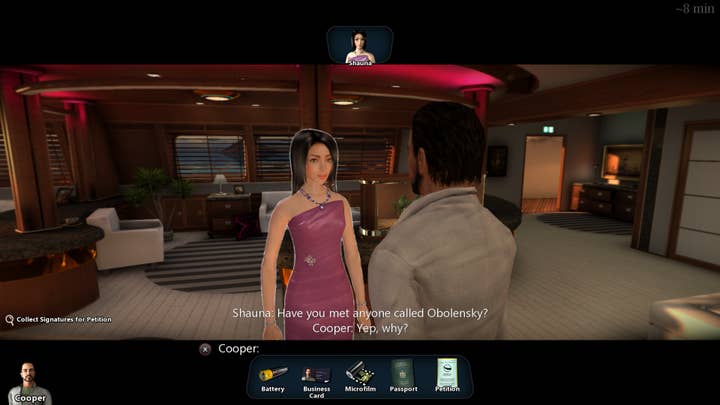What's so casual about 'Casual' games?
Lumino City and Velvet Sundown expose how the Casual market is falling short of its potential
The teeming schedule of Casual Connect Europe is a daunting prospect for any journalist. A dozen tracks featuring several dozen companies giving comfortably north of 100 different talks, exploring every aspect of the most crowded part of a sprawling industry. Time is short, so the choice of who to meet and what to cover demands careful scrutiny.
Well, that's the theory, anyway.
Familiar topics like metrics and retention and casino mechanics and breaking this or that emerging market were all present and correct, prodded from every conceivable angle by a host of successful industry players. From the perspective of a journalist, however, it can be difficult to distinguish between these well-intentioned examinations, coming as they do from businesses with similar products and similar goals. Looking over the schedule this year, though, two companies were utterly distinct from the general discussion. So distinct, in fact, they seemed almost like mythical creatures; unicorns roaming the savannah.
"What we do is very casual, very social gaming. We can reach people who don't associate themselves with games at all"
Elina Arponen, Tribe Studios
The first of these was Tribe Studios, a Finnish developer specialising in "chat-based" role-playing experiences built with a proprietary technology called "Dramagame." In Tribe's products, and specifically Velvet Sundown, each character is controlled by a real person, their dialogue invented in the moment by the player, and reproduced on-screen for the other users. Every player has certain goals to accomplish, and the story progresses from there, often in unexpected and fascinating ways.
The most obvious comparison is Facade, a relatively obscure interactive narrative created by Michael Mateas and Andrew Stern almost a decade ago. When I put this to Elina Arponen, the "Chieftain" of Tribe Studios, she agrees that Facade is one of the few available reference points, and that represents a missed opportunity for supposedly 'Casual' games.
"We get compared to that a lot," she says. "Facade is a very old game and it still stands out as an example. In a way, that's very, very sad. What has happened in all of that time? Not too much. This is a difficult genre, of course, but if [the games industry] had paid any attention to social mechanics and character mechanics it would be much easier by now.

"In the four years I've been working on this I've seen an increase in the number of developers in this area. That's good, but we need a major hit to establish the genre."
Velvet Sundown is still very much a work in progress. Perhaps, eventually, it could be the hit that this nascent genre needs, but right now it seems more instructive to think of it as the seed of a powerful and sorely neglected idea. Arponen argues that this is "social" gaming in the truest sense of the word, and a form that could appeal to an audience more causal than that for games like Angry Birds. The ideas being developed at Tribe Studios could appeal to anyone who's read a book or watched a film - and, for the record, that's a lot more people than have ever played Candy Crush Saga.
"In that sense, what we do is very casual, very social gaming," says Arponen. "We can reach people who don't associate themselves with games at all. Our kind of 'Casual' can find new audiences. It's actually my first time at Casual Connect, and our type of game should fit here very well, but from what I've seen this is a much more hardcore kind of gaming."
"A lot of people seem to define 'Casual' as a free-to-play game with ads and as many millions of users as they can get"
Daniel Fountain, State of Play
And yet Velvet Sundown sits uneasily alongside the games currently being developed to satiate the 'Casual' market. Indeed, when this industry talks about 'Casual' games, it's referring as much to a business model that requires a certain scale to function correctly as it is catering to the tastes and passions of a global population - vast swathes of which is only now waking up to the possibilities of the medium. If Casual Connect is a fair reflection of that 'Casual' market, it's fair to say that diversity of product isn't one of its defining traits. There's a lot of repetition among these products, a lot of riffs on the same few ideas, where the cheerful acceptance of concepts like "churn" seem to run contrary to creative ideals like passion and emotional resonance.
"A lot of people seem to be defining 'Casual' as a free-to-play game with ads and as many millions of users as they can get," says Daniel Fountain, the resident "technical genius" at the second of Casual Connect's unicorns, Lumino City developer State of Play. "For us, 'Casual' is more about the [tastes of the] audience and the aesthetic and the setting.
"One of the nicest experiences we had playing the game with people was at Game City up in Nottingham, where we had a lounge with some sofas and bean bags. Every so often we would peek in there and it was always full of families, with the kids pointing at the screens saying, 'Do this. Do that.' Families just enjoying the game together. That's what 'Casual' means for us."
For Fountain and State of Play's co-founder, Katherine Bidwell, Lumino City is the absolute epitome of a product with casual appeal - and they have a point. When one sees the game in motion, it's difficult to imagine anyone failing to be inspired by its beautiful, hand-crafted world, regardless of their personal relationship to gaming at large. And yet, despite that obvious broad appeal, Lumino City is exactly the sort of product that game companies with the largest reach would view as niche.

"It's not a niche product," Bidwell counters. "There are a lot of people who would appreciate what this is. There are a lot of people who aren't your traditional [casual or AAA] gamer who would love to play Lumino City.
"It's dumbing down casual players. Why can't a game for casual users be something really unique, really immersive, really special? People are looking for a deeper experience, I think, and it worries me a little bit that the industry is becoming 'AAA' games or 'Casual' games. We hope that Lumino City bridges that gap, because it offers something of both."
"Lumino City wouldn't have been built if we were hung up on whether it suited the casual market or not"
Katherine Bidwell, State of Play
The irony is that Lumino City costs £14.99 and - at present - it's only available on PC and Mac, which is far from the industry's current conception of what the 'Casual' market requires. That's by necessity, too, the years of sweat and toil that went into its creation effectively making the prevailing free-to-play model all but impossible to justify on a practical level, let alone the impact it would have on State of Play's vision for the finished product. In this way, at least, 'Casual' gaming's creative potential is being stifled by its close ties to monetisation, and the general reluctance to push back against the rise of free-to-play is leaving a great many potential customers poorly served.
"This game wouldn't have been built if we were hung up on whether it suited the casual market or not," Bidwell says. "There's no monetisation model that would work. It's an immersive story. You can't drag someone away and ask them for a dollar to find out more.
"We're aware that we're ignoring the freemium trend," Fountain adds. "Personally, when I see a game I think I'm gonna like and it's freemium I don't bother. It's either gonna be full of ads or it's going to break the game when you buy an upgrade or be crippled when you don't. We're deliberately ignoring it, and that's a trend I'd like to see happen a lot more. There are experiences that are just impossible to make work for free."

